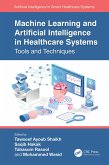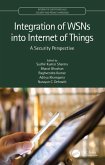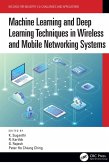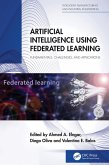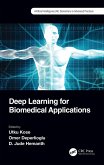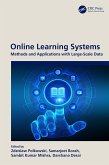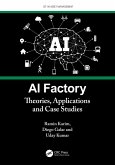Machine Learning and Artificial Intelligence in Healthcare Systems (eBook, PDF)
Tools and Techniques
Redaktion: Shaikh, Tawseef Ayoub; Wasid, Mohammed; Rasool, Tabasum; Hakak, Saqib
63,95 €
63,95 €
inkl. MwSt.
Sofort per Download lieferbar

32 °P sammeln
63,95 €
Als Download kaufen

63,95 €
inkl. MwSt.
Sofort per Download lieferbar

32 °P sammeln
Jetzt verschenken
Alle Infos zum eBook verschenken
63,95 €
inkl. MwSt.
Sofort per Download lieferbar
Alle Infos zum eBook verschenken

32 °P sammeln
Machine Learning and Artificial Intelligence in Healthcare Systems (eBook, PDF)
Tools and Techniques
Redaktion: Shaikh, Tawseef Ayoub; Wasid, Mohammed; Rasool, Tabasum; Hakak, Saqib
- Format: PDF
- Merkliste
- Auf die Merkliste
- Bewerten Bewerten
- Teilen
- Produkt teilen
- Produkterinnerung
- Produkterinnerung

Bitte loggen Sie sich zunächst in Ihr Kundenkonto ein oder registrieren Sie sich bei
bücher.de, um das eBook-Abo tolino select nutzen zu können.
Hier können Sie sich einloggen
Hier können Sie sich einloggen
Sie sind bereits eingeloggt. Klicken Sie auf 2. tolino select Abo, um fortzufahren.

Bitte loggen Sie sich zunächst in Ihr Kundenkonto ein oder registrieren Sie sich bei bücher.de, um das eBook-Abo tolino select nutzen zu können.
This book provides applications of machine learning in healthcare systems and seeks to close the gap between engineering and medicine by combining design and problem-solving skills of engineering with health sciences to advance healthcare treatment.
- Geräte: PC
- ohne Kopierschutz
- eBook Hilfe
- Größe: 36.62MB
Andere Kunden interessierten sich auch für
![Machine Learning and Artificial Intelligence in Healthcare Systems (eBook, ePUB) Machine Learning and Artificial Intelligence in Healthcare Systems (eBook, ePUB)]() Machine Learning and Artificial Intelligence in Healthcare Systems (eBook, ePUB)63,95 €
Machine Learning and Artificial Intelligence in Healthcare Systems (eBook, ePUB)63,95 €![Integration of WSNs into Internet of Things (eBook, PDF) Integration of WSNs into Internet of Things (eBook, PDF)]() Integration of WSNs into Internet of Things (eBook, PDF)51,95 €
Integration of WSNs into Internet of Things (eBook, PDF)51,95 €![Machine Learning and Deep Learning Techniques in Wireless and Mobile Networking Systems (eBook, PDF) Machine Learning and Deep Learning Techniques in Wireless and Mobile Networking Systems (eBook, PDF)]() Machine Learning and Deep Learning Techniques in Wireless and Mobile Networking Systems (eBook, PDF)48,95 €
Machine Learning and Deep Learning Techniques in Wireless and Mobile Networking Systems (eBook, PDF)48,95 €![Artificial Intelligence Using Federated Learning (eBook, PDF) Artificial Intelligence Using Federated Learning (eBook, PDF)]() Artificial Intelligence Using Federated Learning (eBook, PDF)52,95 €
Artificial Intelligence Using Federated Learning (eBook, PDF)52,95 €![Deep Learning for Biomedical Applications (eBook, PDF) Deep Learning for Biomedical Applications (eBook, PDF)]() Deep Learning for Biomedical Applications (eBook, PDF)48,95 €
Deep Learning for Biomedical Applications (eBook, PDF)48,95 €![Online Learning Systems (eBook, PDF) Online Learning Systems (eBook, PDF)]() Online Learning Systems (eBook, PDF)48,95 €
Online Learning Systems (eBook, PDF)48,95 €![AI Factory (eBook, PDF) AI Factory (eBook, PDF)]() Ramin KarimAI Factory (eBook, PDF)65,95 €
Ramin KarimAI Factory (eBook, PDF)65,95 €-
-
-
This book provides applications of machine learning in healthcare systems and seeks to close the gap between engineering and medicine by combining design and problem-solving skills of engineering with health sciences to advance healthcare treatment.
Dieser Download kann aus rechtlichen Gründen nur mit Rechnungsadresse in A, B, BG, CY, CZ, D, DK, EW, E, FIN, F, GR, HR, H, IRL, I, LT, L, LR, M, NL, PL, P, R, S, SLO, SK ausgeliefert werden.
Produktdetails
- Produktdetails
- Verlag: Taylor & Francis eBooks
- Seitenzahl: 356
- Erscheinungstermin: 3. Januar 2023
- Englisch
- ISBN-13: 9781000830903
- Artikelnr.: 67037254
- Verlag: Taylor & Francis eBooks
- Seitenzahl: 356
- Erscheinungstermin: 3. Januar 2023
- Englisch
- ISBN-13: 9781000830903
- Artikelnr.: 67037254
- Herstellerkennzeichnung Die Herstellerinformationen sind derzeit nicht verfügbar.
Dr. Tawseef Ayoub Shaikh is an Assistant Professor in the Computer Science Engineering Department, Baba Ghulam Shah Badshah University (BGSBU), Rajouri, India. He earned his Doctorate from Zakir Hussain College of Engineering and Technology (ZHECT), Aligarh Muslim University (AMU), Aligarh, India. Before this, he earned his M-Tech from Guru Nanak Dev University (GNDU) Amritsar India and B-tech in Computer Engineering from Islamic University of Science and Technology (IUST) Jammu and Kashmir, India. He has five years of teaching and eight years of research experience and has published more than 33 journal/conference papers and book chapters which are indexed in reputed indexing bodies such as SCI, SCIE, WoS, and Scopus. Dr. Shaikh has qualified national-level exams in Computer Science Engineering like UGC-NET, JKSLET, and GATE. He has been granted and completed four fully funded government projects by MHRD, NPIU, and GoI. His areas of expertise include Machine Learning, Medical Data Analysis, Artificial Intelligence, Healthcare Informatics, Deep Learning, Soft Computing. Dr. Saqib Hakak is an Assistant Professor at Canadian Institute for Cybersecurity, Faculty of Computer Science University of New Brunswick, Fredericton, NB, Canada. He has completed his Post Doctorate Research at Canadian Institute for Cybersecurity, University of New Brunswick, Fredericton, in the IBM Project "Endpoint Threat Analytic: A people-oriented Cybersecurity", from Feb 2019 - Aug 2019. He has five years of teaching and eight years of research experience. He has published more than 33 journal/conference papers and book chapters which are indexed in reputed indexing bodies such as SCI, SCIE, WoS, and Scopus. He has three years of industrial experience in Radio Frequency Engineer (Telecom sector), Ericson India Pvt Limited, J&K circle (May 2011 - May 2012), Log analysis using TEMS KIT and analyzing parameters such as RSCP, TX power, EcNo. Dr. Hakak is the journal reviewer of reputed journals such as IEEE Transactions on Intelligent Transportation Systems, Future Generation Computer Systems, IEEE ACCESS, Mechanical Systems, and Signal Processing, etc. His areas of expertise are Natural language processing (NLP), Machine learning, Data Analyses, Data science for Security Applications, Medical data Analysis. Dr. Tabasum Rasool is a Research Associate (RA) at the Division of Interdisciplinary Sciences, Indian Institute of Science (IISc) Banglore. She is a Doctorate from the National Institute of Technology (NIT), Srinagar, and has published over ten papers in reputed journals/conferences and book chapters which are indexed in reputed indexing bodies such as SCI, SCIE, WoS, and Scopus. She has 9 years of research experience. Her areas of expertise include Machine Learning, Fuzzy Computing, Genetic Optimization Techniques, and Water Source Management. Dr. Mohammed Wasid is an Assistant Professor in the Department of Computer Science & Engineering, Govt. Engineering College, Bharatpur, Rajasthan. He earned his Doctorate from Zakir Hussain College of Engineering and Technology (ZHECT), Aligarh Muslim University (AMU), Aligarh, India. He has five years of teaching experience and eight years of research experience. He has published more than 25 papers in journals/conferences and book chapters which are all indexed in reputed bodies such as SCI, SCIE, WoS, and Scopus. Dr. Wasid has qualified national-level exams in Computer Science Engineering like UGC-NET and GATE. He has been granted and completed three fully funded government projects by MHRD, NPIU, and GoI. His areas of expertise include Machine Learning, Recommendation Systems, Soft Computing, and Pattern Recognition.
1. Artificial Intelligence Challenges, Principles, and Applications in
Smart Healthcare Systems. 2. Systematic View and Impact of Artificial
Intelligence in Smart Healthcare Systems, principles, challenges and
Applications. 3. Application of Machine Learning Techniques in COVID-19
Epidemiology: A Glimpse. 4. Automated Seven-Level Skin Cancer Staging
Diagnosis in Dermoscopic images using Deep Learning. 5. Ensemble
Classifier Based Predictive Model for Type-2 Diabetes Mellitus Prediction.
6. Machine Learning Approaches for Analysis in Smart Healthcare
Informatics. 7. Smart Approaches for Diagnosis of Brain Disorders using
Artificial Intelligence. 8. Bridging the Gap Between Technology and
Medicine: Approaches of Artificial Intelligence in Healthcare. 9. Brain
Tumor Classification using Transfer Learning. 10. Advanced Bayesian
Estimation Of Weibull In Early Stage Eye Loss Prediction In Diabetic
Retinopathy. 11. Automated Sleep Staging Using Single-Channel EEG SIgnal
based on Machine Learning Approaches. 12. Machine Learning Based
Intelligent Assistant for Smart Healthcare. 13. AI-Enabled Sentiment
Analysis on COVID-19 Vaccination: A Twitter based study. 14. An Early
Diagnosis of Lung Nodule Using CT Images based on Hybrid Machine Learning
techniques. 15. Early Detection of Alzheimer's Disease Assisted by
AI-Powered Human-Robot Communication.
Smart Healthcare Systems. 2. Systematic View and Impact of Artificial
Intelligence in Smart Healthcare Systems, principles, challenges and
Applications. 3. Application of Machine Learning Techniques in COVID-19
Epidemiology: A Glimpse. 4. Automated Seven-Level Skin Cancer Staging
Diagnosis in Dermoscopic images using Deep Learning. 5. Ensemble
Classifier Based Predictive Model for Type-2 Diabetes Mellitus Prediction.
6. Machine Learning Approaches for Analysis in Smart Healthcare
Informatics. 7. Smart Approaches for Diagnosis of Brain Disorders using
Artificial Intelligence. 8. Bridging the Gap Between Technology and
Medicine: Approaches of Artificial Intelligence in Healthcare. 9. Brain
Tumor Classification using Transfer Learning. 10. Advanced Bayesian
Estimation Of Weibull In Early Stage Eye Loss Prediction In Diabetic
Retinopathy. 11. Automated Sleep Staging Using Single-Channel EEG SIgnal
based on Machine Learning Approaches. 12. Machine Learning Based
Intelligent Assistant for Smart Healthcare. 13. AI-Enabled Sentiment
Analysis on COVID-19 Vaccination: A Twitter based study. 14. An Early
Diagnosis of Lung Nodule Using CT Images based on Hybrid Machine Learning
techniques. 15. Early Detection of Alzheimer's Disease Assisted by
AI-Powered Human-Robot Communication.
1. Artificial Intelligence Challenges, Principles, and Applications in
Smart Healthcare Systems. 2. Systematic View and Impact of Artificial
Intelligence in Smart Healthcare Systems, principles, challenges and
Applications. 3. Application of Machine Learning Techniques in COVID-19
Epidemiology: A Glimpse. 4. Automated Seven-Level Skin Cancer Staging
Diagnosis in Dermoscopic images using Deep Learning. 5. Ensemble
Classifier Based Predictive Model for Type-2 Diabetes Mellitus Prediction.
6. Machine Learning Approaches for Analysis in Smart Healthcare
Informatics. 7. Smart Approaches for Diagnosis of Brain Disorders using
Artificial Intelligence. 8. Bridging the Gap Between Technology and
Medicine: Approaches of Artificial Intelligence in Healthcare. 9. Brain
Tumor Classification using Transfer Learning. 10. Advanced Bayesian
Estimation Of Weibull In Early Stage Eye Loss Prediction In Diabetic
Retinopathy. 11. Automated Sleep Staging Using Single-Channel EEG SIgnal
based on Machine Learning Approaches. 12. Machine Learning Based
Intelligent Assistant for Smart Healthcare. 13. AI-Enabled Sentiment
Analysis on COVID-19 Vaccination: A Twitter based study. 14. An Early
Diagnosis of Lung Nodule Using CT Images based on Hybrid Machine Learning
techniques. 15. Early Detection of Alzheimer's Disease Assisted by
AI-Powered Human-Robot Communication.
Smart Healthcare Systems. 2. Systematic View and Impact of Artificial
Intelligence in Smart Healthcare Systems, principles, challenges and
Applications. 3. Application of Machine Learning Techniques in COVID-19
Epidemiology: A Glimpse. 4. Automated Seven-Level Skin Cancer Staging
Diagnosis in Dermoscopic images using Deep Learning. 5. Ensemble
Classifier Based Predictive Model for Type-2 Diabetes Mellitus Prediction.
6. Machine Learning Approaches for Analysis in Smart Healthcare
Informatics. 7. Smart Approaches for Diagnosis of Brain Disorders using
Artificial Intelligence. 8. Bridging the Gap Between Technology and
Medicine: Approaches of Artificial Intelligence in Healthcare. 9. Brain
Tumor Classification using Transfer Learning. 10. Advanced Bayesian
Estimation Of Weibull In Early Stage Eye Loss Prediction In Diabetic
Retinopathy. 11. Automated Sleep Staging Using Single-Channel EEG SIgnal
based on Machine Learning Approaches. 12. Machine Learning Based
Intelligent Assistant for Smart Healthcare. 13. AI-Enabled Sentiment
Analysis on COVID-19 Vaccination: A Twitter based study. 14. An Early
Diagnosis of Lung Nodule Using CT Images based on Hybrid Machine Learning
techniques. 15. Early Detection of Alzheimer's Disease Assisted by
AI-Powered Human-Robot Communication.

